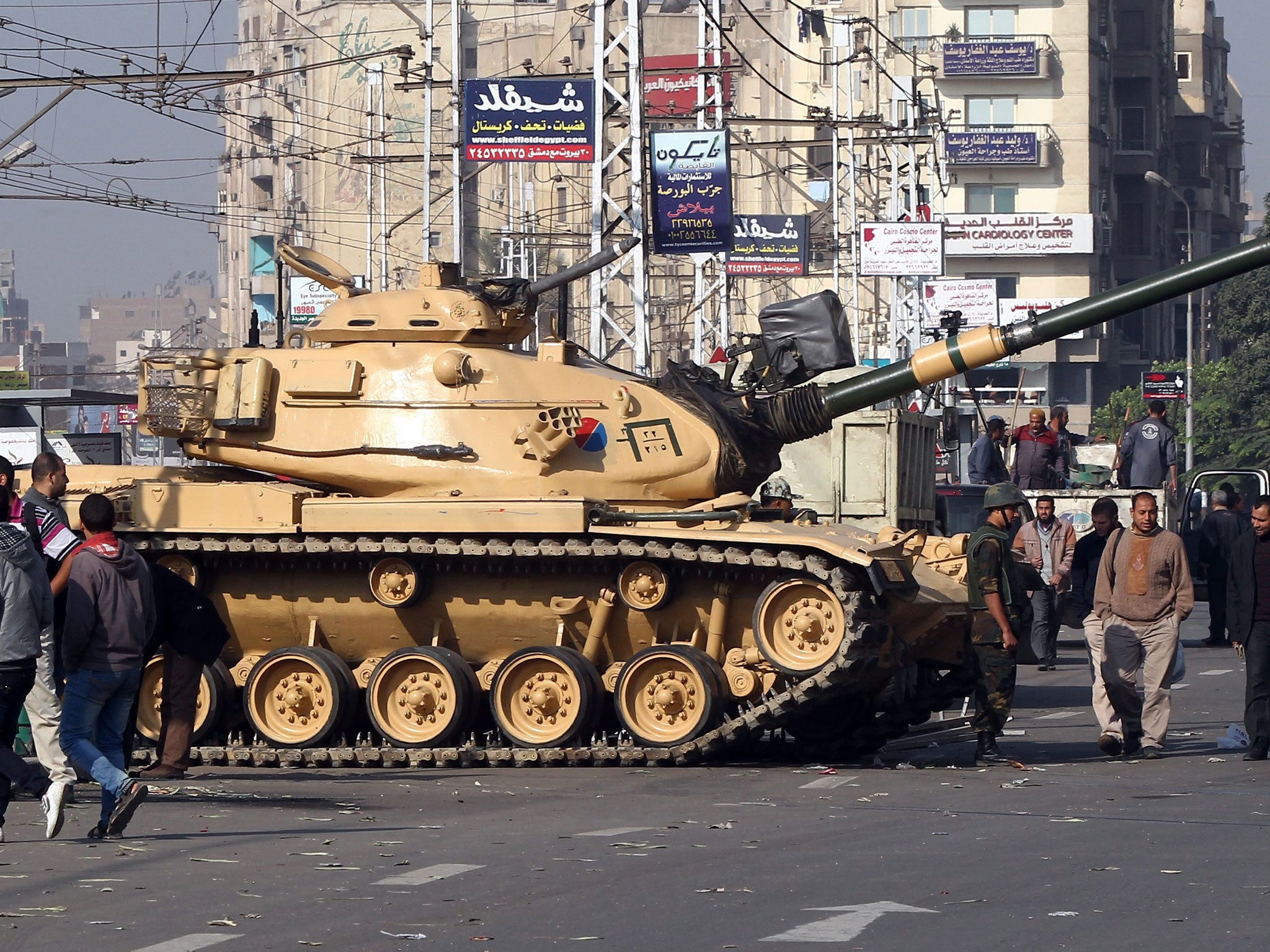Morsi rolls out the tanks as Cairo braces for further violence
Rights groups claim Muslim Brotherhood's use of shotguns led to escalation of clashes

Your support helps us to tell the story
From reproductive rights to climate change to Big Tech, The Independent is on the ground when the story is developing. Whether it's investigating the financials of Elon Musk's pro-Trump PAC or producing our latest documentary, 'The A Word', which shines a light on the American women fighting for reproductive rights, we know how important it is to parse out the facts from the messaging.
At such a critical moment in US history, we need reporters on the ground. Your donation allows us to keep sending journalists to speak to both sides of the story.
The Independent is trusted by Americans across the entire political spectrum. And unlike many other quality news outlets, we choose not to lock Americans out of our reporting and analysis with paywalls. We believe quality journalism should be available to everyone, paid for by those who can afford it.
Your support makes all the difference.Military tanks and troops were deployed to stand guard outside Mohamed Morsi’s presidential palace today after a series of brutal street battles which many fear could herald a dangerous tipping point for the unrest in Egypt.
As Cairo braced itself for further protests this weekend, the Egyptian leader's elite guard was called up to help defend the palace from further violence after protests left seven people dead and more than 600 injured today.
The avenues and back streets close to the palace – near to where several thousand Egyptians fought running battles with each other today – were largely quiet as many protesters melted away following a military order demanding they leave the vicinity. But with more demonstrations planned today – and neither side in the confrontation willing to back down – further violence appears inevitable.
"This is a dangerous time," said Yassar el-Hawari, an official from the liberal Al-Dostour Party. "The Muslim Brotherhood is making war on the Egyptian people."
Mr Morsi used a televised address to the Egyptian people last night in response to the violence to call for "a full, productive dialogue with all figures and heads of parties, revolutionary youth and senior legal figures to meet this Saturday". But opponents said they planned to continue their protests.
Senior Brotherhood officials have accused their opponents of instigating the riots. In a statement released by the group today, its secretary general, Mahmoud Hussein, said: "The use of violence is nothing to do with real revolutionaries' ethics."
However, opponents and human rights groups have alleged that it was only after pro-Morsi demonstrators began using shotguns and tear gas that the clashes escalated.
Karim Ennarah, a researcher for the Egyptian Initiative for Personal Rights, said he saw supporters of Mr Morsi firing birdshot pellets soon after the rival groups of protesters came to blows. "It was the Muslim Brotherhood who started firing. They had shotguns and were showering us with shotgun pellets," he said.
One of those who died in the hail of fire was Al-Hosseiny Abu Deif, an Egyptian reporter who was struck in the head by a rubber bullet. According to Reporters Without Borders, he had taken photographs of the President's supporters carrying "sophisticated weapons".
Following Mr Morsi's power grab last month – along with his rush to shoehorn the new constitution through an Islamist-dominated assembly – frustration among Egypt's liberal and secular opposition is bubbling over into anger. Yet the Brotherhood feels its strong showing at the ballot box entitles it to hold sway over the transition process.
A referendum on Egypt's new constitution is due to take place on 15 December.
Egypt’s revolution: Cairo in crisis
11 February 2011 Following weeks of protest President Hosni Mubarak steps down and hands power to the Supreme Council of the Armed Forces (SCAF).
19 November 2011 Disaffection with military leadership reaches fever-pitch, and week-long clashes between police and demonstrators leave 42 dead.
22 January 2012 Parliamentary election results announced, with Islamist parties celebrating an overwhelming victory.
24 June 2012 Muslim Brotherhood candidate Mohamed Morsi narrowly wins presidency.
September/October 2012 Non-Islamists boycott assembly, accusing it of forcing through Islamist agenda.
22 November 2012 Morsi unilaterally issues a decree affording him sweeping new powers.
Alex Ward
Join our commenting forum
Join thought-provoking conversations, follow other Independent readers and see their replies
Comments